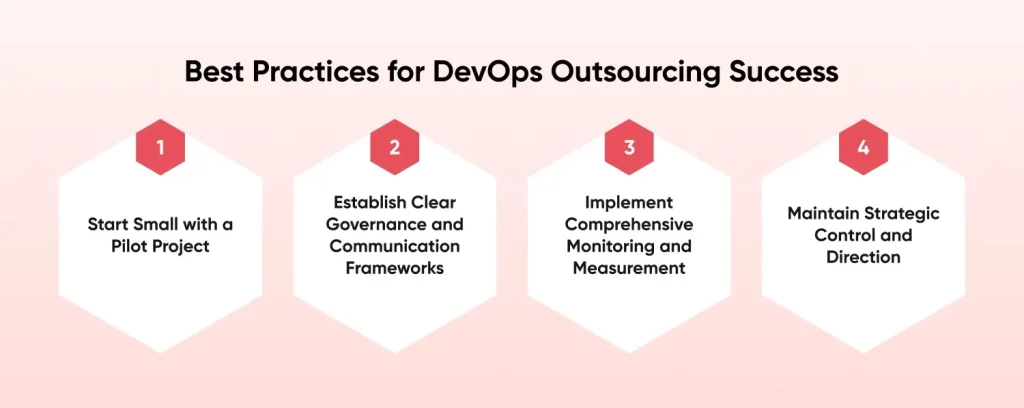In today’s hyper-competitive digital landscape, enterprises face mounting pressure to accelerate software delivery while maintaining quality and security standards. The solution many industry leaders are turning to? DevOps outsourcing.
This strategic approach isn’t limited to cost savings, but also improving time to market, and building scalable infrastructure that grows with your business.
If you’re an enterprise leader considering DevOps outsourcing, you’re likely weighing the benefits against potential risks. This comprehensive guide will show you why DevOps outsourcing has become the smartest strategic move for enterprises and provide a proven framework for implementing it successfully. The DevOps market is expected to grow at an estimated valuation of USD 10.4 billion in 2023 to a staggering USD 25.5 billion by the year 2028.
The Enterprise DevOps Challenge: Why In-House Teams Aren’t Always Enough
Modern enterprises operate in an environment where software deployment cycles have compressed from months to days, sometimes hours. The pressure to deliver continuous value while maintaining operational excellence has never been higher. Yet most organizations struggle with fundamental DevOps implementation challenges.
The Talent Shortage Crisis
The global shortage of skilled DevOps professionals has reached critical levels. According to recent industry reports, there are over 3.5 million unfilled cybersecurity and DevOps positions worldwide. For enterprises, this translates to extended hiring cycles, inflated salaries, and fierce competition for top talent. Even when companies successfully recruit DevOps engineers, retaining them becomes an ongoing challenge as demand continues to outstrip supply.
Complex Technology Stack Management
Enterprise environments are rarely simple. They often rely on legacy systems, span multiple cloud platforms, use a mix of programming languages, and must meet strict compliance demands. Building an internal team with deep expertise across this wide and varied technology landscape takes a huge investment of time, money, and effort.
On top of that, keeping up with the constant evolution of DevOps tools and best practices adds yet another layer of complexity. For most organizations, this learning curve is steep—and ongoing.
Scaling Challenges and Resource Allocation
Enterprise projects often experience fluctuating resource demands. During peak development cycles, teams need additional DevOps consulting services support, but maintaining large permanent teams during slower periods becomes cost-prohibitive. This feast-or-famine cycle makes it difficult to optimize resource allocation and maintain consistent delivery velocity.
What is DevOps Outsourcing and Why is it More ThanJust Cost Reduction?
DevOps outsourcing refers to partnering with external specialists to handle some or all aspects of your DevOps implementation and management. This includes everything from initial strategy development and tool selection to ongoing infrastructure management and continuous integration/continuous deployment (CI/CD) pipeline optimization.
But successful DevOps outsourcing is about much more than traditional IT outsourcing. It requires a true strategic partnership with consulting providers who not only understand enterprise software but can also fit smoothly into your existing development workflows.
Key Components of Enterprise DevOps Outsourcing
Modern DevOps outsourcing encompasses several critical areas:
- Infrastructure as Code (IaC) implementation and management across multi-cloud environments
- CI/CD pipeline design and optimization for enterprise-scale applications
- Security integration throughout the development lifecycle (DevSecOps)
- Monitoring and observability solutions for complex distributed systems
- Compliance automation for regulatory requirements across different industries
- Performance optimization and scalability planning for enterprise workloads
The Strategic Advantages: Why Outsourcing Wins vs In-house
Access to Elite Expertise and Specialized Knowledge
When you implement DevOps for enterprise environments, you need professionals who understand both cutting-edge technologies and enterprise constraints. DevOps outsourcing companies maintain teams of specialists who have implemented solutions across multiple industries and technology stacks.
These experts bring battle-tested experience from hundreds of implementations. They’ve encountered and solved the specific challenges your enterprise faces, from legacy system integration to regulatory compliance automation. This depth of experience would take years to develop internally and comes at a fraction of the cost of building equivalent expertise in-house.
Accelerated Implementation and Time-to-Market
External DevOps teams can typically implement solutions 40-60% faster than internal teams building capabilities from scratch. They bring established frameworks, proven methodologies, and pre-built automation tools that eliminate common implementation bottlenecks.
For enterprises launching new products or expanding into new markets, this acceleration can mean the difference between capturing market opportunity and watching competitors establish dominance. The role of DevOps developer is essential for keeping up this competitive velocity.
Cost Optimization and Predictable Budgeting
While cost of DevOps outsourcing varies based on scope and complexity, enterprises typically achieve 30-50% cost savings compared to building equivalent internal capabilities. These savings come from several sources:
- Reduced hiring and training costs for specialized roles
- Eliminated infrastructure overhead for DevOps tools and platforms
- Optimized cloud resource utilization through expert management
- Predictable monthly costs instead of variable internal expenses
Risk Mitigation and Compliance Assurance
Enterprise environments require strict adherence to security protocols, compliance requirements, and operational standards. Established DevOps outsourcing providers maintain comprehensive security certifications, compliance frameworks, and risk management protocols that many enterprises would struggle to implement independently.
These providers also carry professional liability insurance and maintain rigorous data protection standards, transferring significant operational risk away from your organization.
Scalability and Flexibility
Outsourced DevOps services give enterprises the kind of scalability that’s hard to achieve in-house. Whether you’re preparing for a big product launch, tackling a system migration, or navigating an acquisition, you can quickly ramp up support without the burden of long-term commitments.
And when the project is completed or there is a change in priorities, teams can be descaled or upscaled to match current needs. This flexibility also applies to technology choices, letting you pick the right tools and platforms as your environment grows. As new tools and platforms emerge, your outsourcing partner can evaluate, test, and implement them without requiring your internal team to master every emerging technology.
Potential Challenges and How to Address Them
Communication and Cultural Integration
Challenge: Working with external teams can create communication gaps and cultural misalignment that impact project success.
Solution: Establish clear communication protocols from day one. Implement daily standups, weekly strategic reviews, and monthly business alignment meetings. Choose outsourcing partners who demonstrate strong English communication skills and cultural compatibility with your organization’s values and working style.
Security and Data Protection Concerns
Challenge: Sharing sensitive data and system access with outside teams always comes with security risks.
Solution: Take a zero-trust approach when working with external partners. Give them only the access they absolutely need through role-based permissions, secure everything with VPN connections, and keep thorough audit logs of all activity. Just as important, make sure your outsourcing DevOps company holds certifications like SOC 2 Type II, ISO 27001, and any industry-specific standards your business requires—so you know they’re meeting strict security and compliance standards.
Knowledge Transfer and Dependency Management
Challenge: Over-reliance on external teams can create knowledge gaps within your organization and vendor dependency risks.
Solution: Structure contracts to include knowledge transfer requirements. Ensure documentation, training sessions, and gradual capability transfer are built into the engagement model. Maintain hybrid teams where internal staff work alongside external specialists to absorb critical knowledge.
Quality Control and Performance Monitoring
Challenge: Ensuring external teams meet your enterprise standards for code quality, performance, and reliability.
Solution: Establish clear Service Level Agreements (SLAs) with measurable performance metrics. Implement automated quality gates, performance monitoring, and regular review cycles. Use objective measurement tools rather than subjective assessments to evaluate outsourcing partner performance.

How to Find and Hire DevOps Outsourcing Partner That Best Suit Your Project?
Technical Expertise and Experience Evaluation
Your ideal outsourcing partner should demonstrate deep expertise across your specific technology stack and industry requirements. Look for providers who can show:
- Proven experience with enterprise app development services in your industry
- Certifications from major cloud providers (AWS, Azure, Google Cloud)
- Case studies demonstrating successful large-scale DevOps implementations
- Technical leadership who can engage in strategic architecture discussions
When evaluating AWS DevOps outsourcing capabilities specifically, ensure the provider maintains AWS Advanced Consulting Partner status and can demonstrate expertise with enterprise-grade AWS services like Control Tower, Organizations, and Security Hub.
Cultural Fit and Communication Assessment
Technical skills alone don’t guarantee success. Your outsourcing partner must integrate effectively with your existing teams and organizational culture. During the evaluation process:
- Conduct working sessions with proposed team members to assess communication style and problem-solving approach
- Evaluate their project management methodology and ensure alignment with your preferred frameworks (Agile, Scrum, etc.)
- Review their client retention rates and request references from similar enterprise clients
- Assess their flexibility in adapting to your existing processes and tools
Service Portfolio and Scalability Options
Enterprise needs evolve rapidly, so choose partners who can grow with your requirements. Evaluate their ability to provide:
- Comprehensive DevOps managed services covering the full application lifecycle
- Specialized expertise in emerging areas like containerization, microservices, and serverless architectures
- Multi-cloud capabilities to avoid vendor lock-in and optimize costs across platforms
- 24/7 support options for mission-critical applications and infrastructure
Security and Compliance Standards
Enterprise DevOps outsourcing requires partners who understand and can implement enterprise-grade security controls. Verify:
- Security certifications (SOC 2, ISO 27001, PCI DSS as applicable)
- Compliance experience with regulations relevant to your industry (HIPAA, GDPR, SOX, etc.)
- Data residency options to meet geographic and regulatory requirements
- Incident response capabilities and disaster recovery procedures
Best Practices for DevOps Outsourcing Success

Start Small with a Pilot Project
Instead of handing over your entire DevOps operation right away, it’s smarter to begin with a focused pilot project. Pick a basic application or a specific component of your infrastructure. This benefits your team as it allows you to:
- Assess the partner’s skills and approach in a low-risk setting
- Fine-tune communication and collaboration processes
- Build trust and confidence before scaling up the relationship
- Spot and solve any integration issues early on
Best practices for DevOps outsourcing consistently show that successful long-term partnerships begin with carefully managed pilot engagements that demonstrate value and build mutual understanding.
Establish Clear Governance and Communication Frameworks
Effective governance structures are critical for DevOps outsourcing for enterprises. Implement:
- Regular stakeholder meetings with both technical and business representatives
- Escalation procedures for addressing issues quickly and effectively
- Performance dashboards providing real-time visibility into key metrics
- Change management processes ensuring all modifications are properly reviewed and approved
Implement Comprehensive Monitoring and Measurement
You can’t manage what you don’t measure. Establish comprehensive monitoring for both technical performance and business outcomes:
- Technical metrics: Deployment frequency, lead time for changes, mean time to recovery, change failure rate
- Business metrics: Time-to-market improvements, cost savings, resource utilization optimization
- Quality indicators: Code coverage, security vulnerability reduction, compliance audit results
- Satisfaction measures: Developer productivity, team satisfaction scores, stakeholder feedback
Maintain Strategic Control and Direction
While outsourcing execution, enterprises must maintain strategic control over their DevOps direction. This means:
- Keeping architectural decisions and technology strategy in-house
- Maintaining oversight of security policies and compliance requirements
- Retaining control over vendor relationships and tool selections
- Ensuring alignment between outsourced activities and business objectives
Implementation Roadmap: Getting Started Right
Phase 1: Assessment and Planning (Weeks 1-4)
Begin with a thorough evaluation of your DevOps maturity and requirements:
- Conduct a DevOps maturity assessment to identify gaps and opportunities
- Document existing processes, tools, and team structures to provide context to potential partners
- Define success metrics and objectives for the outsourcing initiative
- Identify pilot project scope and success criteria
Phase 2: Partner Selection and Contracting (Weeks 5-8)
Execute a thorough partner evaluation process:
- Issue RFPs to qualified providers based on your technical and cultural requirements
- Conduct detailed technical interviews and reference checks
- Negotiate contracts with clear SLAs, deliverables, and performance metrics
- Establish legal frameworks for data protection, intellectual property, and compliance
Phase 3: Pilot Implementation (Weeks 9-20)
Launch your pilot project with careful monitoring and regular checkpoints:
- Execute detailed project planning with your chosen partner
- Implement communication and governance structures established during contracting
- Monitor progress closely with weekly reviews and monthly steering committee meetings
- Document lessons learned and adjustment recommendations
Phase 4: Scaling and Optimization (Weeks 21+)
Based on pilot results, expand the partnership scope:
- Evaluate pilot project outcomes against established success criteria
- Scale successful processes to additional applications or infrastructure components
- Refine governance and communication based on lessons learned
- Plan for long-term partnership evolution and capability development
Measuring Success of DevOps Implementation: KPIs and ROI Tracking
Technical Performance Indicators
Track key DevOps metrics to ensure your outsourcing partnership delivers measurable improvements:
- Deployment Frequency: Increase from monthly/quarterly to weekly/daily deployments
- Lead Time for Changes: Reduce time from code commit to production deployment
- Mean Time to Recovery (MTTR): Decrease incident response and resolution time
- Change Failure Rate: Minimize production issues from new deployments
Business Impact Metrics
Connect technical improvements to business value:
- Time-to-Market Acceleration: Measure reduction in product release cycles
- Cost Savings: Track total cost of ownership improvements across people, process, and technology
- Resource Optimization: Monitor cloud infrastructure utilization and cost optimization
- Risk Reduction: Measure security incident reduction and compliance improvement
Partnership Quality Indicators
Ensure your outsourcing relationship remains healthy and productive:
- Service Level Achievement: Track SLA compliance across all contracted services
- Stakeholder Satisfaction: Regular surveys of internal teams working with external partners
- Knowledge Transfer Effectiveness: Measure internal team capability improvement over time
- Innovation Contribution: Track new ideas, tools, and processes introduced by the partner
Common Pitfalls to Avoid
Over-Outsourcing Critical Capabilities
While outsourcing can provide significant benefits, benefits of DevOps outsourcing are maximized when enterprises maintain control over strategic capabilities. Avoid outsourcing:
- Core architectural decision-making that impacts long-term technology direction
- Security policy development and compliance framework establishment
- Vendor relationship management for critical infrastructure providers
- Business-critical system knowledge that creates excessive dependency risk
Inadequate Contract Structuring
Many outsourcing relationships fail due to poorly structured contracts. Ensure your agreements include:
- Clear performance metrics with financial penalties for non-compliance
- Intellectual property protections for custom code and configurations
- Termination clauses that protect your ability to transition services if needed
- Pricing models that align partner incentives with your cost optimization goals
Insufficient Change Management
Internal teams often resist outsourcing initiatives without proper change management. Address this by:
- Communicating the strategic rationale clearly to all stakeholders
- Involving internal teams in partner selection and integration planning
- Providing training and development opportunities for internal staff to work effectively with external partners
- Recognizing and rewarding successful collaboration between internal and external teams
Future-Proofing Your DevOps Outsourcing Strategy
Embracing Emerging Technologies
Your outsourcing partner should help you stay ahead of technology trends rather than simply maintaining current systems. Look for partners who can provide expertise in:
- Artificial Intelligence and Machine Learning integration into DevOps processes
- Edge computing and distributed infrastructure management
- Quantum-safe security preparation for post-quantum cryptography
- Sustainable computing practices and green IT initiatives
Building Adaptive Partnerships
The most successful DevOps outsourcing relationships evolve with changing business needs. Structure your partnerships to:
- Review and adjust service levels quarterly based on business priorities
- Incorporate new technologies and methodologies as they mature
- Scale services dynamically based on project demands and market conditions
- Develop hybrid delivery models that combine outsourcing with internal capabilities
Planning for Organizational Growth
As your enterprise expands—whether organically or through acquisitions—your DevOps outsourcing strategy needs to keep pace. This means thinking beyond just technology to ensure your partner can support:
- Global service delivery to meet the needs of operations across multiple regions
- Seamless integration of newly acquired organizations and their existing infrastructure
- Regulatory compliance with varying laws and industry standards across different markets
- Cultural adaptability to collaborate effectively with diverse, international teams
Why Hire Dedicated Developers for DevOps Outsourcing From CMARIX?
When you hire dedicated developers from CMARIX for your DevOps outsourcing needs, you get a team that understands enterprise requirements and can work alongside your existing teams. Our dedicated DevOps professionals bring practical experience and proven methodologies to help streamline your development and deployment processes.
What CMARIX DevOps Developers Provide:
- Experienced Team: Our DevOps engineers have hands-on experience with enterprise environments, cloud platforms, and the compliance requirements that come with larger organizations.
- Flexible Support: We offer continuous support and monitoring services to maintain smooth system operations, with the ability to scale our involvement based on your current needs.
Measurable Results: Our enterprise software solutions reduce deployment times, improves system uptime and more.
Final Words
Working with an outsourced DevOps team has become a critical factor in enabling digital transformation across all enterprise systems.The real value comes when your outsourcing partner becomes a trusted, strategic ally who supports your growth and helps your business adapt to an ever-changing landscape.
The companies that will move ahead in the years ahead are the ones that can adapt quickly to shifting market demands while keeping their operations running smoothly. DevOps outsourcing gives you the flexibility, expertise, and scalability needed to balance both helping you stay competitive and future-ready.
FAQs on DevOps Outsourcing
What Is DevOps Outsourcing and How Does It Work?
DevOps outsourcing means hiring external teams to handle your software development and operations processes. These teams manage automated deployments, monitor applications, and maintain infrastructure as an extension of your internal team.
Why Should Enterprises Consider Outsourcing DevOps?
Enterprises face talent shortages and high costs for skilled DevOps professionals. Outsourcing provides immediate access to experienced teams while allowing the team to focus internal resources on core business activities.
Is DevOps outsourcing cost-effective compared to in-house teams? Yes, outsourcing typically costs 30-50% less than building an in-house team. You save on hiring, training, and tool costs while getting predictable monthly expenses.
What Are the Best Practices for Successful DevOps Outsourcing?
Start with a test project to test the partnership before scaling up. Establish clear communication channels and maintain control over strategic decisions while letting the team handle technical execution.
What Tools and Technologies Are Used by DevOps Outsourcing Providers?
Common tools include Jenkins or GitLab for automation, Docker and Kubernetes for containers, and cloud platforms like AWS or Azure. They also use monitoring tools like Prometheus and infrastructure tools like Terraform.







